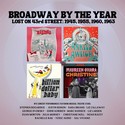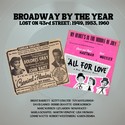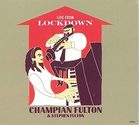|
Our long dry spell, still not fully broken, of being away from being in an audience in a carefree way to feel the electricity of live performances can be relieved to a degree by hearing recordings of artists delivering that magic. Here are a couple of collections of previously unissued recordings from the series of the long-running/but now so long on-hold Broadway by the Year concerts featuring musical theatre singers taking place at The Town Hall in Manhattan's theatre district. And then something resulting from the sign-of-the-times substitute for such mass indoor gatherings—webcasts, this one featuring singer/pianist Champian Fulton and a terrific brass player who happens to be her father.
 VARIOUS ARTISTS VARIOUS ARTISTS
BROADWAY BY THE YEAR
LOST ON 43rd STREET: 1945, 1955, 1960, 1963
Original Cast Records
CD
When it comes to appreciating the legacy of Broadway musicals, historical perspective isn't quite everything, but it's interesting. That context is one reason why the concert series Broadway by the Year was both enlightening and entertaining. For most of the events in its own history, which began when this century began, it focused on productions on the Great White Way seen in a single calendar year (as opposed to the theatre season that includes the latter part of one year and the first month of the next). CDs were released of many of these live, one-night-only events, but not everything in the generous-length evenings could fit on one disc; one companion release called The Broadway Musicals Cut-Outs gathered 15 miscellaneous worthy performances that hadn't been included on the others. Now, more of those missing-in-action items, culled from half a dozen nights, are seeing the light of day at last, with two volumes getting the ball re-rolling. They're called Broadway by the Year: Lost on 43rd Street (referencing the location of The Town Hall), and there's much to be enjoyed on both. Track order is grouped by the relevant year, yet not chronologically so. Each volume has a mix of super-famous fare and lesser known items.
The 16 selections on the issue surveying the years 1945, 1955, 1960, and 1963 offer much variety in style and tone, from razzle-dazzle to sentimental to sly humor. The concert and resulting released album of The Broadway Musicals of 1945 understandably heavily featured the formidable Rodgers & Hammerstein Carousel, so much so that there were still enough numbers remaining from the live show to feature here, too. For some reason, "The Highest Judge of All" was judged to be worth reappearing. (I guess god is in the detail or maybe as poetic justice to be twice released as the song itself is cut from some mountings.) Marc Kudisch was certainly up to the challenge of this assertive piece as the character of Billy Bigelow, and further puts his stamp on the role when he and Christiane Noll do a rewardingly nuanced performance of "If I Loved You"—the whole "bench scene" with its dialogue and many sections. She is also heard to good advantage as the character Carrie for the score's "When the Children Are Asleep" with Eddie Korbich charming mightily as her Mr. Snow; both have played those roles in productions.
Song and dance man Noah Racey brings his appealing energy and personality to a few showy show tunes. He gets the exultant title number of She Loves Me and the slinky "I've Got a One-Track Mind" from the zippy 1945 Billion Dollar Baby (the show, with a score by Morton Gould, Betty Comden, and Adolph Green is one of many that didn't originally get a cast album in its day, but got its due with a studio recording on the same label that is releasing these live excerpts, Original Cast Records). And he and Sarah Brians exhibit cute chemistry on a list song about behaviors resulting from romantic attraction: "When I'm in Love," from Steve Allen's bio-musical about Sophie Tucker.
Also heard in the hearty musical banquet are two songs each from Oliver! and 110 in the Shade (note that the sound quality differs because one was performed "unplugged," a tradition at the programs). Then there's that boisterous Cole Porter concoction "The Ritz Roll and Rock" (the unsilky Silk Stockings blast from the coupling of Justin Bohon and Rachelle Rak) and a real-life married couple Sal Viviano and Liz Larsen reveling in each other's company as "Two Lost Souls" (Damn Yankees). And for a sparkling touch of Christmas, there's Here's Love's double dose of yuletide cheer with, for a change of style, the a capella jazz vocal group Toxic Audio giving the Broadway veterans a break.
Those looking for the more obscure show tunes may be pleased and/or frustrated that three things in that category are rescued, but without their lyrics, in peppy, polished versions by pianist Ross Patterson and his Little Big Band (in truth, the glibly misogynist words for "Treat a Woman Like a Drum," from the operetta Marinka, are disturbing if taken seriously and deserve a beating themselves). However, Ankles Aweigh's "Ready Cash" and Christine's "Happy Is the Word" are, in a word, happy, and I think you'll be happy to hear them, too.
The excitement of live performances is well captured as we hear the audience's delight in laughter and grateful bursts of applause at big endings and climaxes in danced sections. One of those unique "live" unplanned moments is caught as laughter erupts when a singer adlibs a line as a winking reference to a partner's earlier obvious solo line flub. (I won't give away the surprise here.)
While playing the tracks in the presented order, or any order, might feel random by nature of the "rescue mission" at hand, these Lost treats are welcome, as are those on the other collection issued (so far).
Not included are any of the trademark quips and interesting trivia about the shows from the narration by host/creator Scott Siegel, whose Broadway by the Year programs remain on hold, although he's more than busy presenting Broadway material at the Manhattan nightclubs Feinstein's/54 Below and The Green Room 42, as well as his many filmed editions of "Broadway's Greatest Hits" found online on Youtube. But we look forward to Broadway by the Year resuming live—and more of these belatedly issued concert excerpts, too.
 VARIOUS ARTISTS VARIOUS ARTISTS
BROADWAY BY THE YEAR
LOST ON 43rd STREET: 1949, 1953, 1960
Original Cast Records
CD
When we hear the audience break into laughter several times during "Adventure" from the 1960 musical Do Re Mi, you can tell they're tickled by Tovah Feldshuh's comic timing, facial expressions, and Comden & Green's jokey, schticky lyric itself as she lurches through Jule Styne's hamminess-inviting melody, teamed with Eddie Korbich playing the self-deprecating husband. It's what makes live recordings like those on Broadway by the Year: Lost on 43rd Street 1949, 1953, 1960 so kinetically recall what it's like to sit in a theatre and react to specific moments a performer is nailing. Another aspect of audience appreciation is for the versatility that can be shown in a short span, such as when this veteran then becomes dignified and dramatic with Camelot's "I Loved You Once in Silence," a more mature voice navigating the melody and rueful words. This cornucopia of previously unissued renditions from the Broadway by the Year concerts is a bounty of musical theatre souvenirs that bowed in three specific years.
We're presented with one or two numbers from each represented show, with the exception of South Pacific, which gets three. This collection includes one sample each from two shows that never got cast albums; they are the ones featured on the CD cover: All for Love's "The Humphrey Bogart Rhumba," played by the band; and Carnival in Flanders's tender "For a Moment of Your Love," grandly presented in formal manner by Davis Gaines. The release is notable for such serious-minded stalwart leading man performances: Brent Barrett's "I'll Never Say No" (The Unsinkable Molly Brown); Robert Westenberg's "Stay Well" (Lost in the Stars); Marc Kudisch's "If Ever I Would Leave You" from Camelot, including an madrigal-like introduction you may not know existed; and Scott Coulter's ardor-drenched "Younger Than Springtime" and Can-Can's "I Am in Love."
When Eddie Korbich puts a dash of his own polish on "Put on a Happy Face," much is owed to the way it first faced Broadway audiences in Bye Bye Birdie. But, contrastingly, this particular cornucopia has a few arrangements that veer more than usual from their original Broadway blueprints, showing how pianist Ross Patterson can be on fire and show his jazz chops with his Little Big Band. It's refreshing for those who want something beyond scaled-down architecture that gives leeway for personalization and looseness for performers. For example, Debbie Gravitte tears through "It's All Right with Me" in fun, feisty fashion and Marla Schaffel makes "I Love What I'm Doing" jaunty and playful.
Another female spotlight comes with Lisa Vroman doing Do Re Mi's "Cry Like the Wind" with utmost seriousness and a glorious high climax. Liz Larsen builds drama and desperation with the title song of Irma La Douce. And Karen Ziemba shines in two duets from Miss Liberty: with Ms. Schaffel as both claim to not care about a guy ("You Can Have Him"); and happy to stroll with a guy ("Let's Take an Old-Fashioned Walk"), Noah Racey.
There are also group numbers ending up in this catch-all, all from 1949 scores: "Give Me Your Tired, Your Poor" (Irving Berlin's setting of the poem on the base of the Statue of Liberty for Miss Liberty); two South Pacific pieces ("Bali Ha'i" and "There Is Nothin' Like a Dame"); and just a few bars of "It's Good to Be Alive" (from Texas, Li'l Darlin'), which was sung as a perky end-of-show farewell. Host Scott Siegel is heard only here, calling out their names as they entered for bows. Bows are well deserved all around, including one for Original Cast Records label owner Bruce Yeko for arranging to procure from the archives and finally put out these performances from years ago in the year we were all so very much missing—and glad to welcome back—live Broadway music.
 CHAMPIAN FULTON and STEPHEN FULTON CHAMPIAN FULTON and STEPHEN FULTON
LIVE FROM LOCKDOWN
Champian Records
CD and digital
In pandemic-defined times—like other musicians finding themselves gig-less and with time on their hands, but songs still in their hearts, and a bit of techno knowhow—singer-pianist Champian Fulton turned on a camera and a smile and turned to the internet. Her weekly webcasts called Live from Lockdown beamed her bright style and swing directly to fans similarly stationary. A same-titled collection represents a survey of some of the standards populating those programs, sung with heart, plus a few instrumentals, all with her trumpet and flugelhorn-playing father Stephen Fulton as her sole and very interactive partner. At turns intimate and party-like, the only blatantly missing element missing from Live ... is a live audience's sounds of appreciation and joy. Like the fans who checked out the ongoing series, we listeners to this souvenir supply our own implied applause and cheers.
Both instrumentalists are inventive with melodies and embellishments as they interweave and balance each other entertainingly. This is true during the sung sections and the breaks on vocal tracks, as well as the purely instrumental ones. The piano can be driving or serve almost as commentary on the lyrics, and the brass is never competitive or too forceful. But it certainly is not merely decorative or subsidiary. Dad and daughter are an ideally balanced team that seem to be conversing through music, filling in the blanks and blanketing us with sound and no small amount of whimsy.
The singer takes her time parsing and parading the words. Vocals are generally easygoing, the lyrics delivered with a sense of contentment, or at least cheery bemusement, or at the very least, an assessment that the metaphorical glass is more than half full. Pluck is present. Still, the depressed devil's advocate in search of drama and despair will argue that, if you know these songs, several have bittersweet observations and definitely tell of disappointment and loneliness. Maybe that's just a pesky detail for a determined Champion Fulton with the survival skills anyone in trying times can benefit from adopting.
Let's consider how gloom is minimized and the spotlight shines on the positive possibilities. Cole Porter, who is represented as a songwriter once on each of several items in the Fulton discography (she now has 14 releases as leader), is well served this time by a spiffy treatment of his "What Is This Thing Called Love?." It somehow does not dwell on the consequence of rejection in romance ("You took my heart and threw it away"), perhaps dazzled by—yet accepting—that no one can "solve its mystery." We might even interprets its line "Why should it make a fool of me?" not as resigned and rueful, but resistant and determined, suggesting the line in the also-included "Satin Doll" that declares "I'm nobody's fool, so I'm playing it cool as can be" in Johnny Mercer's text with the Duke Ellington/ Billy Strayhorn melody. Even the clear-eyed behavioral summation that "You've Changed" stating that "it's all over now" might suggest a time for moving on rather than falling apart.
But when material offers a more obvious opportunity for unbridled cheer and celebrating good times, the Fultons groove with the glee. "Look for the Silver Lining" is at first simple and earnest with its homespun philosophy, but before sincerity can risk turning trite, the tempo picks up to gallop through the glee, goo-free. And serenely bubbly is "I'm Forever Blowing Bubbles," now a few years past its 100th anniversary (it was heard in Broadway's The Passing Show in 1918), underplaying the lyric's content about bubbles (aka hope) bursting and how, "like my dreams they fade and die." In this rendition of the song rarely recorded in recent decades, hope springs eternal and bubbles over. "I Hadn't Anyone Till You" epitomizes the mindset of focusing on the here and now of gratitude for finding a partner at last, not looking backwards at what was missing and missed in the past.
When Champian Fulton the pianist lets Champian Fulton the singer take a break, we get to fully concentrate on her formidable keyboard skills and dazzling duo doings with the flugelhorn or trumpet. The romps are rather engaging. One of their originals, "Midnight Stroll," also appears on a prior release saluting the singer's still-evident role model, Dinah Washington. (The earlier version was in a quartet setting.)
No longer just live in lockdown, Champion Fulton has resumed touring to do in-person engagements; this month finds her performing in venues in New York, Pennsylvania, Illinois, and Spain, as well as two outdoor settings in New Jersey!
|
|